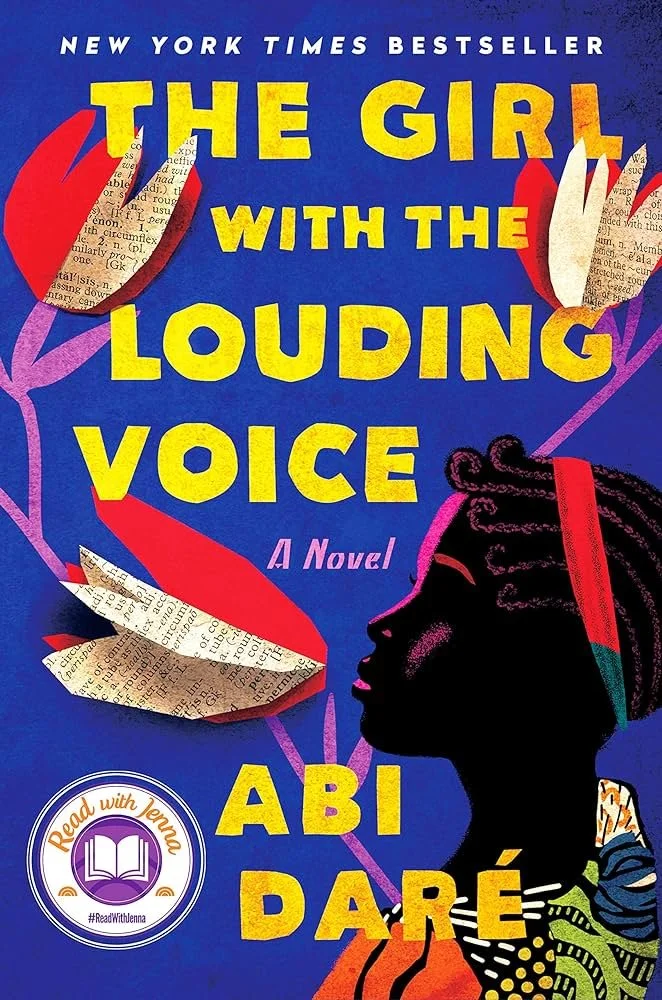The Girl with the Louding Voice by Abi Daré
If ever a title was so central to the essence of a novel, to the story of a main character, it was in the case of Adunni, the protagonist of The Girl with the Louding Voice.
From the beginning of the novel, Daré introduces us to Adunni as a teenage girl having lost her mother, and now is shouldering the responsibilities of a young Nigerian girl. Responsibilities that I and many others are familiar with, whether it be in a village in Ikati or in American suburbia, a Nigerian girl, whether the oldest girl, or only girl, or both, is raised differently from her brothers, and questions why are largely unwelcome.
Daré laces several themes though the novel that you continue to think back to once you reach the end. Themes that are not new, but continue to illicit real and raw reactions as they are still present in everyday life irrespective of where you live in the world. Being most familiar with Nigeria however, I am more aware of how these themes are a driving force for the way women live. Because for many, it’s a matter of survival.
The commodification of young girls particularly raised in poor families is the first theme introduced in the novel. Adunni becomes a ‘good’ to be traded in exchange for money and sustenance, under the guise of marriage, as her father is unable to continue supporting her education and familial needs. She is married off to Morufu, a much older man with two wives and several children. The sterile, transactional nature of this arranged marriage is no clearer than when Adunni’s father says that Morufu will give him an additional 10,000 naira if she gives birth to a boy.
This is the first time we see Adunni use her voice in the novel, and express her feelings about what is happening to her, despite the end result. She pleads with her father not to allow this marriage to take place. She reminds him of the promise he made to her mother before she died. She talks about her love for school and wanting to continue her education. Her petition to reject the marriage proposal falls on deaf ears, as the father believes Adunni is of age to get married, despite being only fourteen years old. And with the opportunity to accept a substantial brideprice in exchange for her hand, her father does not change his mind.
The pressure to have children, regardless of age is a theme that shortly follows in the novel. Adunni’s reception into the Morufu household is mixed, as the older wife, Labake, is cold and bitter, while Khadijah, the younger wife, is more accommodating. The two of them form a friendship that mitigates Adunni’s pain of her mother’s death and leaving her family.
As the friendship between Adunni and Khadijah unfolds, we see their perspectives as girls raised within this culture when Khadija shares her means of survival stemming from feeling anchored with having children, and presently, hoping to have male children. The value of education is not regarded nearly as much as how many children and what type of children (male vs. female) one is able to have. Adunni sees knowledge and education as a way out and a means of securing a steady future for herself. Khadijah on the other hand, sees security in the children she is able to bear, and she cannot be blamed. When the primary messages that are internalized are ones of value based on what you can produce, it can feel as though there are no other options. Children are her means of survival.
This theme presents itself again later in the novel in the case of Ms. Tia, who in an effort to appease her overbearing mother in law continuously pestering her about children, is violently attacked and beaten in the name of ‘casting out the spirit of barrenness’ by the native doctors that she goes to see. Amidst these experiences the women in the novel endure, none of the men are held accountable for the role they play in the misfortune of these women. Morufu is not blamed for the fact that his wives have not had male children. Instead he looks to marry another wife, Adunni, his youngest wife yet, thinking she will be the one finally to bear him a son. Khadijah, after having several girls, is secretly impregnated by an old flame in pursuit of having a male child. Tia’s husband, Dr. Dada reveals after Tia is relentlessly flogged for her ‘barrenness’, that he is sterile and will likely never be able to have children with her. The ease and blamelessness that men enjoy is envied by their counterparts as Kike, Morufu’s first daughter explains to Adunni, “I wish I am a man. But I am not, so the next thing I can do, I can marry a man.”
The impact of lack of representation is touched on in the novel, and what message is sent to teenagers and young adults who feel limited in what they can achieve. Adunni’s exposure to television and “The Abroad” consistently showcased white people, to the point where she was surprised the first time she saw a person that looked like her on television. Ms. Tia, initially confused by her reaction, realized it made sense when all Adunni saw were European images of people who lived different lives from her in a land so far away it was difficult to grasp as a tangible place.
Adunni’s encounter with the European portrayal of Jesus at the Prophet Miracle Center, though brief, was notable as she did not understand why he was depicted as a figure from ‘The Abroad,’ in a place where no one could relate to such an appearance. This almost fleeting thought, indicated to me that Adunni saw Jesus, and ultimately God, as a reflection of herself. He should look like her. Why would she ever think other? I make a point to highlight this because of a personal journey I am on, where I am divorcing myself from the European imaging of God that I have grown up with throughout my life. If I am made in his image and likeness, then shouldn’t he look like me? Why is it that I have the idea of a being with an appearance that I can’t relate to? This idea of God over the years has made him feel apart from me, separate in a way that did not feel like a complete relationship. But in realizing this and shifting my perspective, changing the way I see God, I have eliminated that feeling of space and distance and the relationship has felt closer. I appreciated this seemingly small but profound component of the novel, and it prompts me to wonder what Daré’s intent was specifically in including it.
Daré is intentional in showcasing the growth of Adunni not only through time and knowledge, but though her first person prose as we progress through the novel. As Adunni is being taught by Ms. Tia and is perfecting her grammar, her inner and outer voice become more polished and grammatically correct in the novel. Her understanding of the English language improves by leaps and bounds, and I appreciated seeing her demonstrate her new understanding of the English language.
Adunni’s story as it began can be applied to so many young girls born into a circumstance they have very little control over. They are taught as early as they can comprehend it that they should be silent, and obedient. That everyone one around them knows better. That they are seen as less and valued as such. What sets her story apart is that she could not stay silent, no matter how hard she tried. She was relentless in finding out what happened to Big Madam’s former housemaid, Rebecca. She fights against Big Madam’s drunk, useless, and perverted husband, referred to as Big Daddy in the novel, towards the end when he forces himself on her, and instances prior, which prompted Adunni to request a lock for her room. With the support of Ms. Tia, she uses her inner voice to write the essay for her scholarship application to go back to school. Adunni speaks not just on her behalf, but unknowingly, for the countless young girls who have lost their voice because of the oppression they have been subjected to. She symbolizes the representation she seeks to draw inspiration from on her journey to a better life. And in thinking beyond the end of the novel, I see Adunni as the teacher she desperately wanted to become, educating other girls not just about the ways of the world, but despite such, to always use their louding voice.

